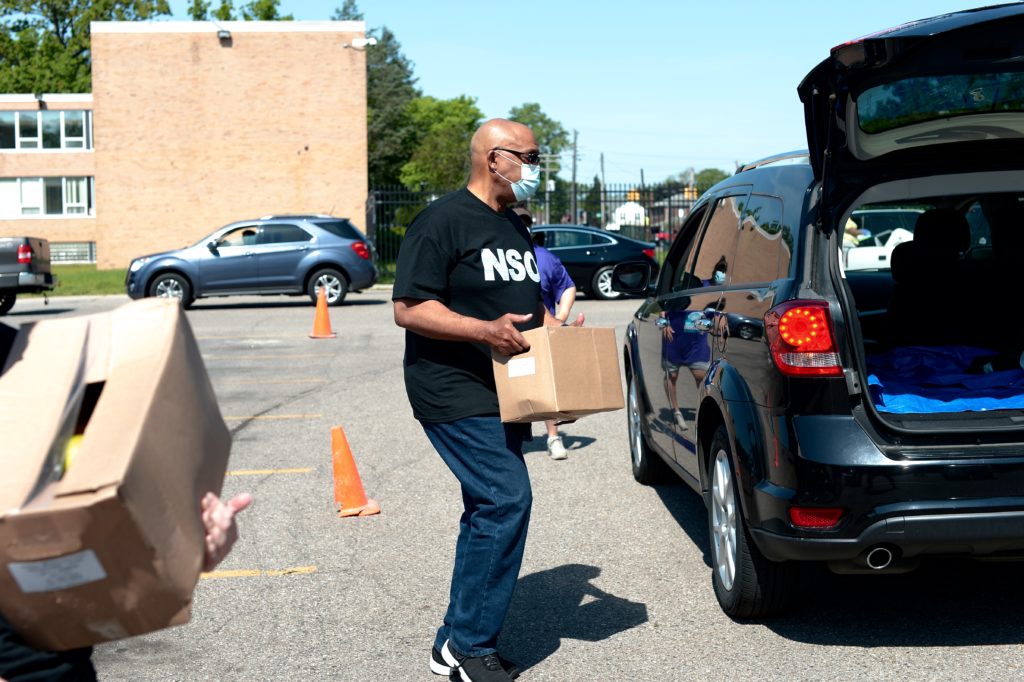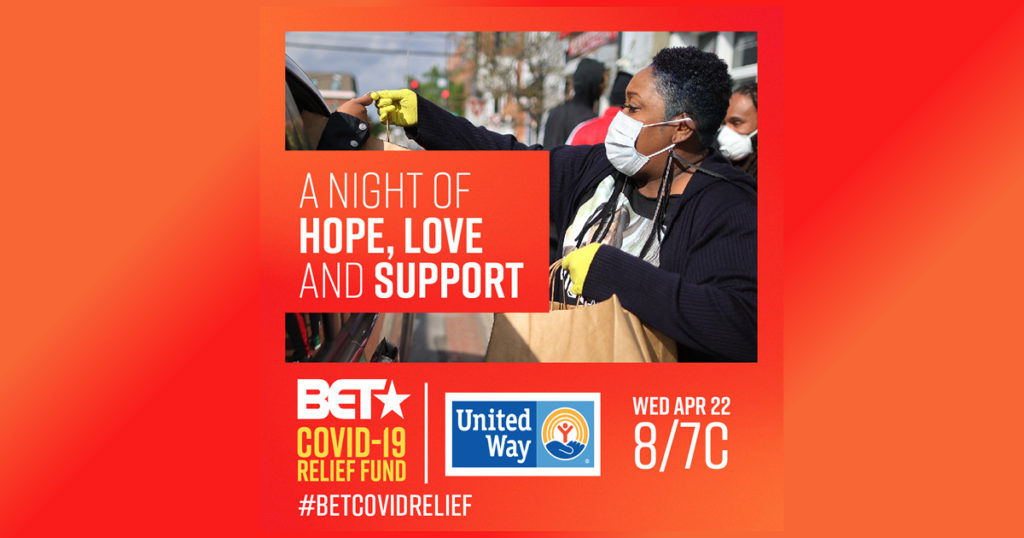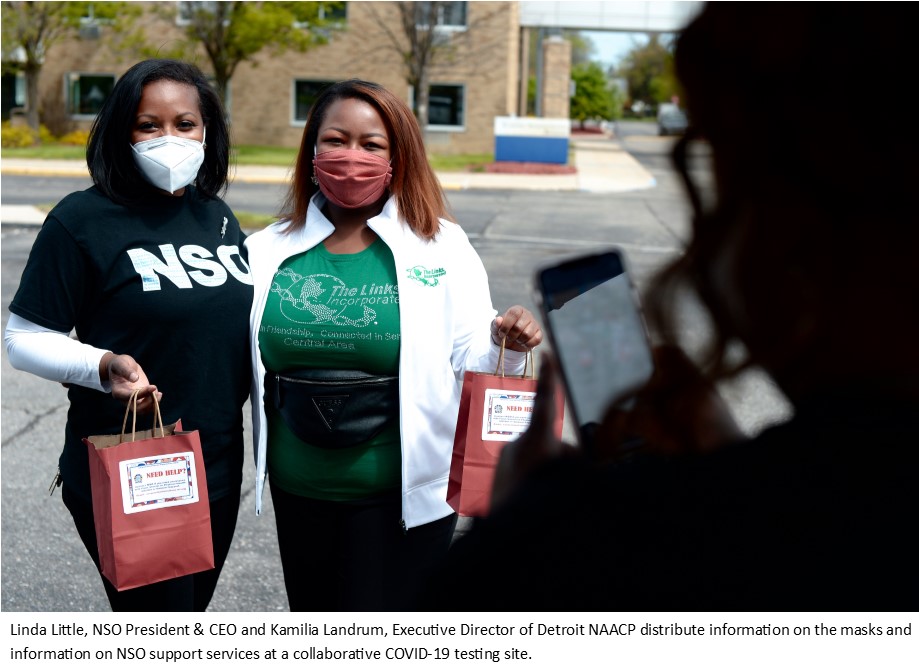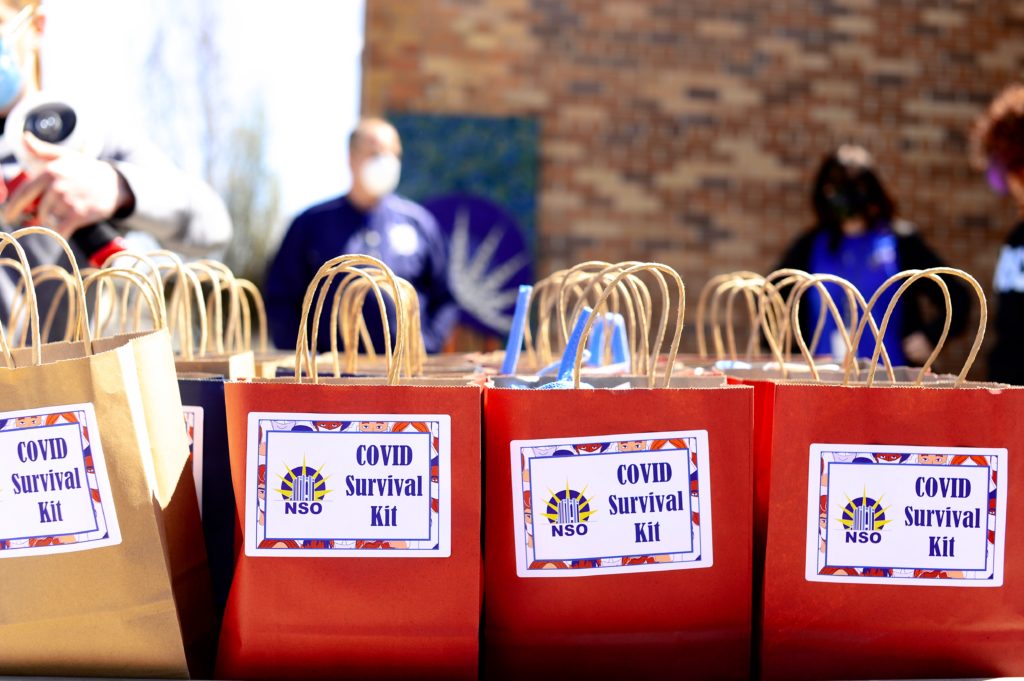United Way COVID-19 fund grants help homeless Detroiters stay safe and healthy
Published on July 13, 2020 in Crisis Relief
The Black community has been disproportionately affected by the COVID-19 pandemic. Thanks to generous support from BET donors, United Way and our partners are working to help.
Spending three days in the hospital with a blood clot in the middle of a global pandemic didn’t scare Eric. What he feared most was what would happen when he left.
Just before being discharged, he revealed to a hospital social worker that he was homeless and living in his car.
“It’s not the situation you expect to find yourself in, but I was out of answers and needed help,” said Eric, who asked that his last name not be used.
Instead of going back to his vehicle or to a cramped shelter, there was a new option available to Eric thanks to the Neighborhood Service Organization (NSO), which has a program that provides 24/7 crisis support for homelessness. With funding from United Way for Southeastern Michigan and the McGregor Fund, the organization opened a first-of-its-kind recuperative housing center in Detroit in May.
Offering hope
The center offers 50 beds of temporary housing and continued care for homeless or housing insecure patients who need a place to continue recovery immediately after release from the hospital.
The center is playing a key role during the pandemic when many shelters are at capacity and working to implement important social distancing protocols.
“What we’re offering is a safe place for people to recover, prevent rehospitalization and make more efficient use of available hospital beds,” said Linda Little, president and CEO at NSO. “We couldn’t have done that without United Way.”
After two weeks at the center, where he received meals, access to a nurse and social worker, and physical and occupational therapy, Eric was connected to a group home with support services with hopes of moving on to individual independent housing.
“I really can’t say enough good things about this place,” Eric said of the center. “I was in my car in agonizing pain. They gave me hope in a terrible situation. Now I can start planning for a future – getting better, getting a job, renting a place where my kids can come visit me.”
Bringing disparity to light
The center is funded in part by funds from the Saving Our Selves: A BET COVID-19 Relief Effort fundraiser. The fundraiser benefitted United Way chapters in New York City, Atlanta, New Orleans, Detroit and Chicago — regions where COVID-19 has had a significant impact on communities of color.
United Way for Southeastern Michigan distributed a total of $2.8 million to nine organizations in the city of Detroit, where the African American population has been disproportionately impacted by the COVID-19 crisis.
The pandemic has highlighted many deeply rooted racial disparities. In Detroit, as of early July, COVID-19 had sickened more than 11,611 residents resulting in 1,722 confirmed virus-related deaths, more than 80 percent of them Black.
“COVID-19 has been especially devastating in communities like Detroit where you have a high prevalence of preexisting conditions compounded by low-wage, service sector jobs, reliance on public transportation (both of which expose individuals to increased infection risk), and the systemic biases that exist in many systems including housing and healthcare,” said Megan Thibos, director of Economic Mobility Initiatives at United Way for Southeastern Michigan.
Statewide, African Americans accounted for 32 percent of all COVID-19 cases and 41 percent of deaths, despite making up only 14 percent of the state’s population, according to data from Michigan’s Department of Health and Human Services.
Homeless populations are already among the most vulnerable to sickness. At NSO, which serves a largely African American population, COVID-19 was a crisis superimposed on another crisis.
“Homelessness simply isn’t compatible with wellness,” Linda said. “In order for people to be mentally and physically healthy, they need to be housed.”
Meeting basic needs
Funding from United Way allowed NSO to place 100 homeless clients in an empty recreation center where they could properly social distance and use cots for comfort.
NSO was also able to hire additional staff members, purchase cleaning supplies and personal protective equipment, and add professional deep cleaning and staff screenings to prevent the spread of COVID-19. They also created a quarantine holding center for any clients who had virus symptoms.
NSO has provided case management outreach to more than 1,000 families in Detroit as a wraparound support to COVID-19 testing sites.
As the pandemic continued, the needs continued to grow. In response, the NSO team also distributed more than 26,000 meals, including meals purchased from local Black-owned restaurants to support clients and restaurants that were struggling to survive due to statewide restrictions.
“Right away, people had needs,” Linda said. “With this virus, there was no runway given. If we weren’t able to evolve our programs right away, people would have gone hungry. The speed of the effort saved lives.”
She said NSO couldn’t have responded as swiftly or as effectively without United Way’s assistance.
“As COVID-19 accelerates existing challenges, we’re finding new opportunities to work with community partners to address acute needs and build lasting stability over time,” Megan said.
Helping people connect
NSO also offers continuing care services to people who were previously homeless. With stay-at-home measures in place, many of those services had to be made virtual. United Way was there to help.
Online art classes helped developmentally disabled adults stay connected and telehealth services made it possible for people to continue to focus on their health while quarantined.
United Way funds allowed NSO to purchase and distribute 50 phones to individuals who didn’t have them or meet the requirements for government-issued cellphones.
“There are people who don’t qualify for other safety nets. Someone has to be that safety net,” Linda said.
She said that for many people, COVID-19 exacerbated pre-existing loneliness. In addition to a meals and other basic needs deliveries, many were happy just to see a friendly face at their door.
“It made people smile and think, ‘Wow, you didn’t forget about me,’” she said.
Making moves
Detroit’s Coalition on Temporary Shelter (COTS) also received grants from United Way to assist with meeting the needs of 108 people in its emergency shelters during the pandemic.
With additional funding from a BET grant, they’re helping 44 families transition into permanent housing. They also support rent and utility assistance, workforce training and education supports for students like laptops and internet access.
Ethel, who didn’t want her last name used, transitioned to permanent housing with her four children after spending six months at COTS. She said she was grateful to receive utility assistance as she plans for her next transition.
“I’m going to be moving soon,” she said. “My utilities needed to be in good standing before I move so the extra help was right on time.”
She added that although the pandemic has made this “a scary time for everyone,” she knows that organizations like COTS and programs offered by NSO can alleviate much of the pressure families feel by offering hope and stability.
“COVID-19 is something that no one expected but I’m in awe of the work that’s happening right now,” Linda said. “I see it as a catalyst for change.”
The BET COVID-19 Relief Fund will remain open for donations through Aug. 31. To donate, visit BET’s website, or texting “BETGives” to 51555.



